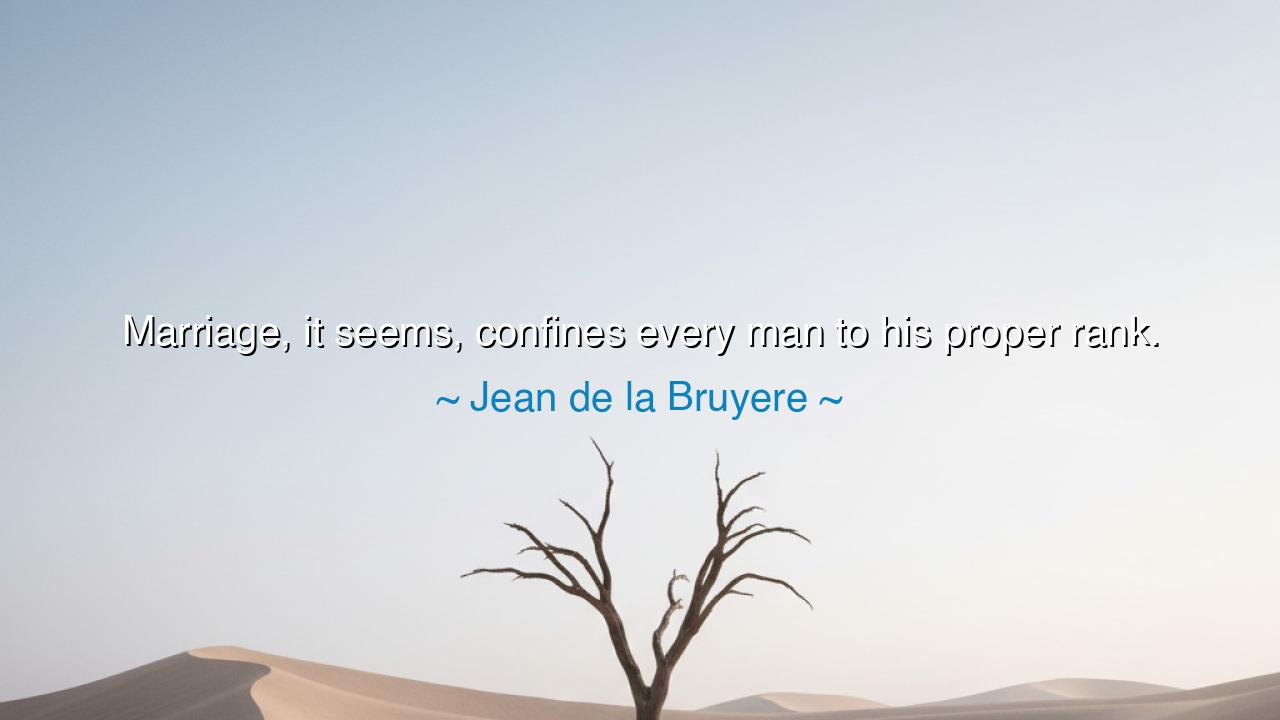
Marriage, it seems, confines every man to his proper rank.






“Marriage, it seems, confines every man to his proper rank.” So spoke Jean de la Bruyère, the keen observer of human nature who roamed the courts and salons of seventeenth-century France, studying the follies and glories of mankind. His words, delicate yet piercing, reveal a truth not of mere social order, but of the soul’s encounter with its own limits. When a man weds, he is no longer the solitary wanderer of ambition or desire. He is anchored, measured, revealed—not by the illusions he once wore before the world, but by the quiet and enduring reality of the life he builds beside another. In marriage, the mask falls, and the man stands at his proper rank, not before kings or peasants, but before truth itself.
In those sacred bonds, each person’s true nature emerges. Marriage does not elevate a fool, nor does it diminish the wise. It is a mirror that reflects the inner nobility—or poverty—of spirit. Many who once glittered in public life are found wanting within the walls of their own homes, for the applause of the crowd cannot drown the silent judgment of a partner’s eyes. And yet, there are humble souls, unknown to fame, who shine in the hearth’s gentle light—faithful, strong, compassionate—rising above all titles and vanities. Thus, de la Bruyère teaches that love and duty reveal what rank truly means: not one bestowed by society, but by character.
Consider the tale of Marcus Aurelius, the philosopher-emperor of Rome. Though he ruled the greatest empire on earth, his letters to his wife, Faustina, show a man not enthroned in power but burdened with tenderness, patience, and sorrow. In the chamber of marriage, his grandeur was tested not by legions or senate, but by the daily labors of fidelity and forgiveness. When their union strained under distance and rumor, Marcus did not wield authority as a weapon; he endured with quiet grace. His rank as emperor was given by Rome, but his proper rank as a man was measured by how he bore the trials of love.
How many men, by contrast, crumble when stripped of their stage! The proud warrior who commands armies finds himself defeated by a simple household quarrel. The eloquent poet who charms the salons grows silent when confronted with the needs of a crying child. For marriage demands not the show of greatness, but its substance. It is the proving ground where the true mettle of the heart is revealed. Here, pride is humbled, vanity unmasked, and ambition purified. The bond of two souls exposes each to themselves—an ordeal both beautiful and severe.
Yet let none despair. For the confinement that marriage brings is not a prison, but a sanctuary. In setting bounds around a man, it grants him the sacred field where he may cultivate virtue. The husband learns patience, the wife endurance; together they learn the wisdom of compassion. Through these limits, love matures into strength. De la Bruyère saw not the chains of marriage, but its alchemy—the way it tempers passion into loyalty and turns freedom into purpose.
Therefore, the lesson is this: honor the rank your soul reveals within the bonds you have chosen. Seek not to appear grander than you are, nor envy the place of others. In love, integrity is nobility; in fidelity, one finds kingship. Let every man labor to make himself worthy of the quiet crown that is his spouse’s respect, and every woman worthy of the peace that comes from steadfast affection.
So, dear listener, if you would live wisely, look not to the thrones of the world for your station, but to your own home. Speak truth there, act justly there, forgive often there. For in that sacred circle, before the gaze of one who knows you fully, you will discover your true rank—not as the world measures it, but as eternity does.






AAdministratorAdministrator
Welcome, honored guests. Please leave a comment, we will respond soon